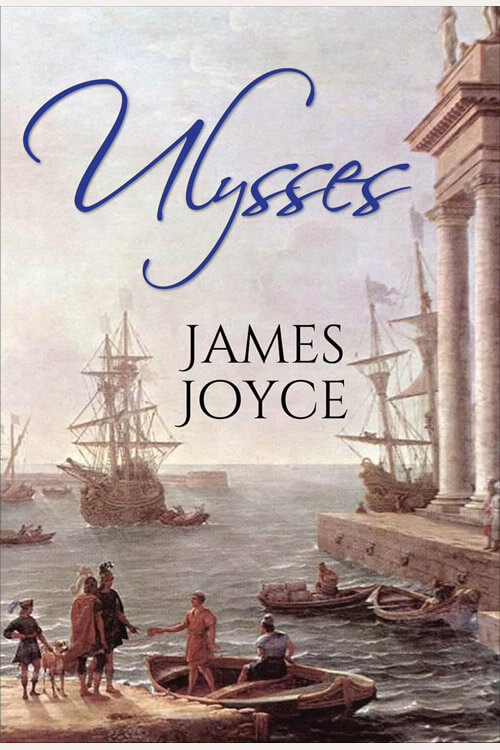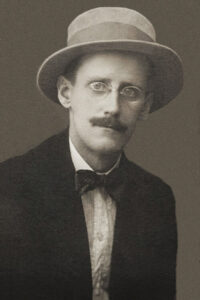
Ulysses
Ulysses is a modernist novel by Irish writer James Joyce. Parts of it were first serialized in the American journal The Little Review from March 1918 to December 1920, and the entire work was published in Paris by Sylvia Beach on February 2, 1922, Joyce’s fortieth birthday. It is considered one of the most important works of modernist literature and has been called “a demonstration and summation of the entire movement.”
According to Declan Kiberd, “Before Joyce, no fiction writer had so foregrounded the process of thinking.” Ulysses chronicles the appointments and encounters of the itinerant Leopold Bloom in Dublin on an ordinary day, 16 June 1904. Ulysses is the Latinised name of Odysseus, the hero of Homer’s epic poem The Odyssey. The novel establishes a series of parallels between the poem and the story, with structural correspondences between the characters and experiences of Bloom and Odysseus, Molly Bloom and Penelope, and Stephen Dedalus and Telemachus, in addition to events and themes of the early 20th-century context of modernism, Dublin, and Ireland’s relationship to Britain. The novel is highly allusive, and its prose imitates the styles of different periods of English literature.
Since its publication, the book has attracted controversy and scrutiny, ranging from an obscenity trial in the United States in 1921 to the protracted textual “Joyce Wars”. The novel’s stream-of-consciousness technique, careful structuring, and experimental prose—replete with puns, parodies, and allusions—as well as its rich characterization and broad humour, have led it to be regarded as one of the greatest literary works in history, Joyce fans worldwide now celebrate 16 June as Bloomsday.
Read or download Book
James Joyce
James Augustine Aloysius Joyce (2 February 1882 – 13 January 1941) was an Irish novelist, poet, and literary critic.
Biography
He contributed to the modernist avant-garde movement and is regarded as one of the most influential and important writers of the 20th century. Joyce’s novel Ulysses (1922) is a landmark in which the episodes of Homer’s Odyssey are paralleled in various literary styles, particularly stream of consciousness. Other well-known works are the short-story collection Dubliners (1914) and the novels A Portrait of the Artist as a Young Man (1916) and Finnegans Wake (1939). His other writings include three books of poetry, a play, letters, and occasional journalism.
Joyce was born into a middle-class family in Dublin. He attended the Jesuit Clongowes Wood College in County Kildare, then, briefly, the Christian Brothers–run O’Connell School. Despite the chaotic family life imposed by his father’s unpredictable finances, he excelled at the Jesuit Belvedere College and graduated from University College Dublin in 1902. In 1904, he met his future wife, Nora Barnacle, and they moved to mainland Europe. He briefly worked in Pula and then moved to Trieste in Austria-Hungary as an English instructor. Except for an eight-month stay in Rome as a correspondence clerk and three visits to Dublin, Joyce resided there until 1915.
In Trieste, he published his book of poems, Chamber Music, and his short story collection, Dubliners. He also began serially publishing A Portrait of the Artist as a Young Man in the English magazine The Egoist. During World War I, Joyce lived in Zürich, Switzerland, and worked on Ulysses. After the war, he briefly returned to Trieste and moved to Paris in 1920, which became his primary residence until 1940. Ulysses was first published in Paris in 1922, but its publication in the United Kingdom and the United States was prohibited because of its perceived obscenity. Copies were smuggled into both countries, and pirated versions were printed until the mid-1930s when publication finally became legal. Joyce started his subsequent major work, Finnegans Wake, in 1923, publishing it sixteen years later in 1939. Between these years, Joyce travelled widely.
He and Nora were married in a civil ceremony in London in 1931. He made several trips to Switzerland, frequently seeking treatment for his increasingly severe eye problems and psychological help for his daughter, Lucia. When France was occupied by Germany during World War II, Joyce moved back to Zürich in 1940. He died there in 1941 after surgery for a perforated ulcer, less than one month before his 59th birthday. Ulysses frequently ranks high in lists of great literature books, and the academic literature analyzing his work is extensive and ongoing. Many writers, filmmakers, and other artists have been influenced by his stylistic innovations, such as his meticulous attention to detail, use of interior monologue, and wordplay, as well as the radical transformation of traditional plot and character development. Though most of his adult life was spent abroad, his fictional universe centres on Dublin. It is primarily populated by characters who closely resemble family members, enemies, and friends from his time there. Ulysses, in particular, is set in the streets and alleyways of the city.
Joyce says, “I always write about Dublin because if I can get to the heart of Dublin, I can get to the heart of all the world’s cities. In the particular is contained the universal.“






